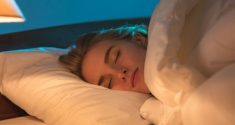Despite what our modern, fast-paced and increasingly urban lives may lead us to believe, the most basic rhythm of the natural world — the rising and setting of the sun — still impacts our health and mental well-being on deep levels. While artificial light may allow us to ignore the natural rhythm of day and night, numerous studies. indicate it isn’t without repercussions to our health.
Research shows home lighting suppresses melatonin production, impacting sleep, circadian rhythm and health. Adding to the growing body of evidence, a recently published study revealed that in 48 percent of homes, evening lighting was bright enough to reduce melatonin by 50 percent, pointing to a need to support melatonin production for better health.
Natural Light Influences Biological Processes
 The rising and setting of the sun is one of the most basic rhythms of the natural world. As a species, humans have developed and lived by this rhythm for most of our existence. Indeed, it is a part of us, impacting many of our fundamental biological processes.
The rising and setting of the sun is one of the most basic rhythms of the natural world. As a species, humans have developed and lived by this rhythm for most of our existence. Indeed, it is a part of us, impacting many of our fundamental biological processes.
Light triggers and regulates many of these processes, including those influenced by the circadian rhythm. This hasn’t changed in the comparatively brief time in the great span of human history that we’ve had artificial light to extend day into and through the night.
Home Lighting Suppresses Melatonin Production
Modern home lighting suppresses melatonin levels by disrupting the natural decrease of light that signals the biological process of melatonin production. When this timing gets skewed, the amount of melatonin produced is also impacted; evening artificial light can lead to an often dramatic decrease in the production of melatonin. Researchers found that, depending on individual light sensitivity, evening artificial light exposure in the average home can lower melatonin production by up to 87 percent.
The type of artificial light has an impact as well. Researchers found that the new, energy-efficient lighting that has replaced the old-style incandescent light bulbs almost doubled the melatonin decreasing effect. This has to do with the greater brightness of the white light and the utilization of blue light to help brighten LED lights.
Melatonin plays a key role in sleep timing and quality. The researchers found that the higher the exposure to artificial light in the three hours before the usual time a person goes to bed, the more likely that person is to experience wakefulness in the hour and a half after going to bed. Disrupted sleeping and waking patterns, along with decreased melatonin production, can have a strong negative impact on the circadian rhythm and its associated biological processes and rhythms.
Circadian Rhythm Critical To Body And Brain Health
The finely tuned, light-sensitive circadian rhythm is essential to physical and mental health. Disruption of this fundamental biological timing system has been connected to a variety of mood disorders, diseases and chronic health conditions. It can impact hormone production and balance, which is connected to a variety of diseases, including certain types of cancer.
Circadian rhythm disruption is also associated with increased risk of obesity, diabetes and other metabolic system disorders. Numerous biological functions depend on the circadian rhythm to operate correctly, supporting the basic mechanical functions of the body as well as overall health.
Take Steps To Boost Melatonin Levels
With the strength of the evidence associating home lighting with decreased melatonin production, it’s important to be proactive about mitigating that drop in melatonin. We live in a modern world, so there’s just so much we can realistically do to decrease exposure to artificial light. However, there are ways to help keep melatonin levels up to the levels typically produced nightly.
Increasing exposure to natural light, especially early in the day, can help — especially when combined with physical activity. This pattern is more in tune with the natural bodily rhythms and offers some of the natural light signals the body craves for optimal function. Limit evening screen time, especially in the hour before bed time. Try to be more conscious of how you use light in the evening, reducing brightness as it gets later.
Diet can help to increase melatonin levels. Olives, tomatoes, walnuts, rice and barley all provide melatonin. Nuts, mushrooms, eggs and fish are also good sources. Make sure to eat plenty of vitamin B-complex foods, particularly Vitamin B 3. As with most health issues, avoiding highly processed foods and building a daily diet composed of real, whole foods can help assemble the quality nutrients necessary to support melatonin production.
Supplements Can Help Regain Rhythm

Supplementing with melatonin while you address lifestyle factors that impact the balance of these three elements just makes sense. While supplementing, work on establishing regular hours for sleeping and waking, increasing physical activity and natural light exposure, and improving overall dietary patterns and nutrition to ensure optimal melatonin levels and good overall health.







